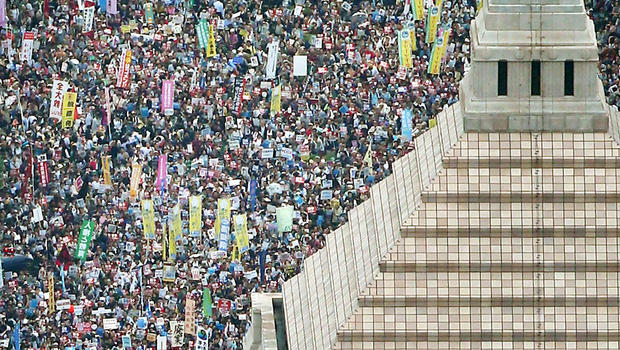-
Tips for becoming a good boxer - November 6, 2020
-
7 expert tips for making your hens night a memorable one - November 6, 2020
-
5 reasons to host your Christmas party on a cruise boat - November 6, 2020
-
What to do when you’re charged with a crime - November 6, 2020
-
Should you get one or multiple dogs? Here’s all you need to know - November 3, 2020
-
A Guide: How to Build Your Very Own Magic Mirror - February 14, 2019
-
Our Top Inspirational Baseball Stars - November 24, 2018
-
Five Tech Tools That Will Help You Turn Your Blog into a Business - November 24, 2018
-
How to Indulge on Vacation without Expanding Your Waist - November 9, 2018
-
5 Strategies for Businesses to Appeal to Today’s Increasingly Mobile-Crazed Customers - November 9, 2018
Tens of thousands protest defence bills outside Japan’s Diet
Tens of thousands of Japanese gathered near parliament in Tokyo Sunday to protest legislation that would authorize the military to fight overseas for the first time since World War Two.
Advertisement
Following a wave of weekly protests near the Diet building in recent months, rally organizers had worked to mobilize 100,000 participants from across the nation.
Katsuya Okada, leader of the largest opposition Democratic Party, said the security-related bills violated Japan’s pacifist Constitution, adding that the Japanese people were angered by the bills with a sense of crisis.
Abe and his allies intend to fundamentally shift the nation from the path of peaceful development that it has pursued in the 70 years since the end of the war in 1945. In July he pushed through the lower house of parliament a group of bills allowing Japan’s armed forces to defend an ally under attack.
Among the crowd of protesters on Sunday was Toshiro Ueyanagi, a lawyer representing the Japan Federation of Bar Associations. “I want people to realize the significance of the bills”.
But many Japanese strongly support Article 9 of their postwar constitution, which renounces the use of offensive force to wage war or settle worldwide disputes.
“I cannot stand idly by when I think of the excesses of the Abe government – Japan could become a country capable of going to war again”, said protester Kenichi Ozawa.
Robert Dujarric, director of the Institute of Contemporary Asian Studies at Temple University Japan, argued in a commentary in The Diplomat that legal technicalities have not exercised a huge influence on Japan’s defence policy in the past, and are unlikely to do so in the future.
Mr Abe has previously said that the change would not lead to involvement in foreign wars.
About 180 women marched near JR Toyama Station in Toyama to voice their opposition to the bills.
The previous day, women who oppose the bills held protest marches across the nation.
But winning over the public majority will likely prove insufficient to the task. The new legislation was rammed through the Diet’s lower house last month and now is under debate in the upper house. Abe’s grandfather Nobusuke Kishi, a former prime minister, faced violent protests against the security treaty he agreed with the US in 1960, but the treaty was approved before he stepped down.
“The security situation surrounding Japan is becoming increasingly challenging”.
Advertisement
Abe and his supporters say the bills are necessary for Japan to deal with the changed security environment.





























